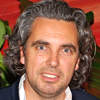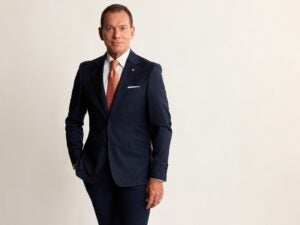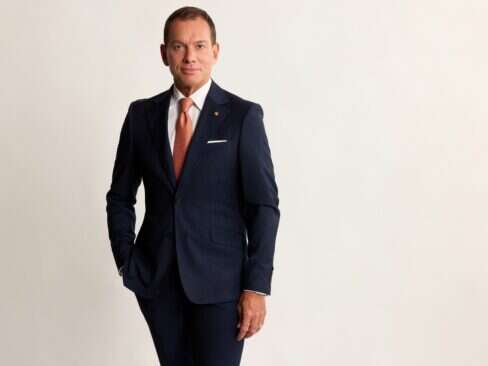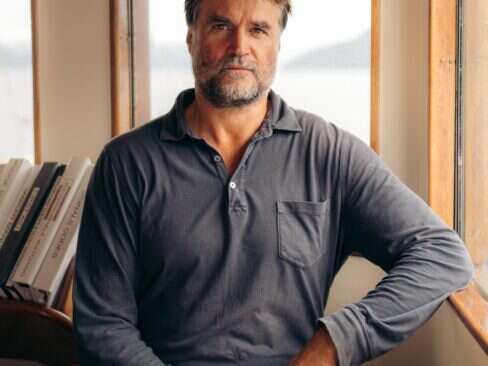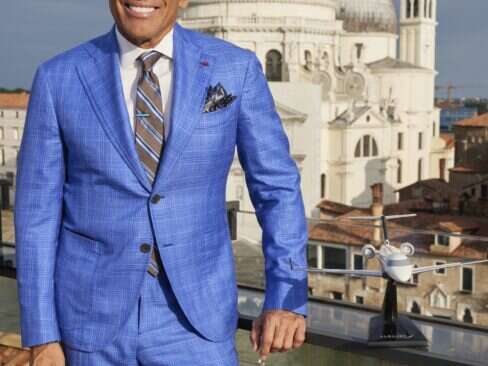
Executive ChairmanShanghai Tang
Shanghai Tang, the Hong Kong-based luxury lifestyle brand owned by Richemont, is quickly evolving from a fun emporium of Chinese-made clothes, accessories and objects, into the standard-bearer of luxury items produced in Asia. Raphael le Masne de Chermont became executive chairman more than six years ago, and he is quickly taking the brand’s high Chinese style around the globe. Elite Traveler met with him this month at the Mandarin Oriental in New York, just before his inauguration of this city’s chapter of the Mandarin Collar Society. He discussed the new area of quality manufacturing in China, the unbeatable service levels available in Asia, and why it’s time for men to be liberated from their neck ties—his personal mission with the creation of the Society.
ET: How did your career in luxury lifestyle brands begin?
Raphael le Masne de Chermont: I’ve been in the luxury industry since I completed business school. I got my MBA in France, and knew I didn’t want to stay in France. I concluded that to the rest of the world, the French are known for food and luxury. I couldn’t cook, so I went into luxury! I worked for Cartier, in 1987, in London. And with Cartier I went around the world. Then I entered the watch business with Piaget and other brands, and became CEO for the watch business in Asia. At that point I knew I loved Asia, and there were so many interesting things to see in China then before its economic boom. I asked Johann Rupert [Executive Chairman, Compagnie Financiere Richemont, the parent company of Cartier and Piaget] if he was interested in me putting the first Chinese luxury brand on a global scale. In Shanghai Tang, David Tang had created a beautiful Chinese emporium based on the glamour of 1930s China. It was a concept, but not a brand. My role was to bring it to the next level, and make Shanghai Tang an international, Chinese-inspired luxury brand. I joined Shanghai Tang in 2002, and it went from three to 40 boutiques around the world. It has good profitability. Now this brand is creating what was once thought to be impossible—added value luxury out of China.
ET: You are in New York today to launch the local chapter of Shanghai Tang’s Mandarin Collar Society. What is that?
Raphael le Masne de Chermont: The Mandarin Collar Society’s mission is to liberate man from the neck tie. Shanghai Tang had to differentiate its fashions from the Western definition of elegance, which is symbolized by the neck tie. The Mandarin collar is based on a military uniform. We started brainstorming this concept during the internet boom, when young rich guys were not conforming to ties. The tie equaled the leash of the corporate man, whereas successful men were able to take off their ties among their peers. So I called on a group of movers and shakers to join a small club—88 members—of liberators. The society has ten chapters in prominent cities. There are the Asian cities of Beijing, Singapore, Hong Kong and Shanghai, the fashion capitals of Paris, London, New York and Tokyo, and the others will likely be Delhi or Mumbai, and a city in the Middle East. In each city, we are inviting eight founding members to join and preach friendly liberation.
In New York, the chapter includes the pianist Lang Lang, cellist Yo-Yo Ma, San Francisco Mayor Gavin Newsom, and CC Pei, the son of architect I.M. Pei. Then four or five local members are pre-selected. In London, members include athlete Linford Christie, art dealer Max Wigram, and auction house chairman Simon de Pury. They are all interesting achievers in their own fields. We all tell the world who we are, that we are happy with our lives, that we have achieved things, and can take off the tie—at least for a moment. If a member is caught wearing a neck tie, he has to buy champagne for the next gathering! It is hard for bankers, but now some have more leisure time to take off the tie! The society also tells the world that China is growing, and it invented a lot of things. There is no reason that some kind of elegance—taking aside the Mao jacket—can’t exist since the Chinese embrace elegance and it’s a good time for China and branding.
ET: Are you abiding by the no-tie mandate?
Raphael le Masne de Chermont: I haven’t worn a neck tie in six and a half years, since I joined Shanghai Tang, and I love it. I wrote a manifesto against the tie! Without a neck tie, it is easier to eat dim sum soup—the tie would be going to the dry-cleaner a lot otherwise. I don’t even wear a tie at funerals, but in Asia the appropriate attire for a funeral is white, not with a tie. I debated the concept of the neck tie with Hermes, and am challenging Dunhill to the debate.
I don’t want the world to see China as a cliché created by the West. It is more than the nation taking jobs from the Western world. They are working hard, and benefiting from it. Life in China is becoming much more expensive as the RMB appreciates against the dollar. The country is setting minimum wages, so now low-cost production is moving out of China and into SE Asian countries. It’s a new era for China, which implies it’s time to end the copying of products and to invent on its own strengths. The Chinese are doing it now by buying a lot of brands. Remember 25 years ago, “made in Japan” meant cheap. But now Sony is very creative and not cheap. Now China has to.
This hotel company, Mandarin Oriental, brings Asian service around the world, which is lost in the West. In China, there is a very great sense of humility and service, not arrogance. That is due to the philosophy, religion and upbringing of the society, and that Asians can control their egos better than those in the West. Life is much easier in Asia. Hong Kong is a very business-oriented city, but it still has the tradition of respect for elders. It makes for a good mix of efficiency and tradition.
ET: How are the clothes and accessories that Shanghai Tang sells serving the Mandarin Collar Society’s mission, and still allowing men to feel formally dressed?
Raphael le Masne de Chermont: We have Mandarin collar tuxedos. And with suit jackets that have a Mandarin collar, when you close your jacket and button it, it can become formal very quickly. Each Asian country has always had its own formal outfit, whether a Middle Eastern nation, Indian, or any other. Asia is a multitude of cultures, and they are all old cultures. So they have their own definition of elegance. China had a tendency to not embrace its traditional cultures as much as, say, the Malay or Indian people did. But historically, for many years, the men in China wore dresses. Then with Mao, there was nothing traditional. And they had to re-invent. David Tang reinvented the velvet loose cut jacket, which Prince Charles and David Bowie wear, and even the owner of Brioni wears when he is in Asia. It is beautiful and formal, and the Mandarin collar makes it a mix between East and West.
ET: What do members of the Mandarin Collar Society do when they meet?
Raphael le Masne de Chermont: Members get together whenever they wish. When I go to a city, I meet with members. Privileges include access to VIP services at all Mandarin Oriental hotels in the world, plus membership into China Clubs in Singapore, Beijing and Hong Kong. And we are building a new program of privileges. And the end of the day, it is a friendly club of happy people who want to meet. One member sold a really big plane to another. There are only 88 founding members, and they are only men.
ET: What is the future for the Shanghai Tang brand?
Raphael le Masne de Chermont: Like all brands, we are being cautious because of the unstable global economy. We are managing in a tight way. We have five new boutiques opening in a span of nine months. Two opened in Hong Kong’s airport this week, Dubai got a second shop two weeks ago. And we will be launching watches. China invented the compass, and it originally was used by Feng Shui masters, so they could determine if locations were good. The Shanghai Tang watch will have a compass in it, and it is unique in that it points south. The literal translation of compass in China is “showing south.” That is because China’s great explorers were always exploring towards the sea, and in China that is to the south. We are working with our parent company Richemont, because it is the best watch group, and they are advising on quality, but we will be making this watch in China. I was involved with Panerai when Richemont acquired that brand, so in a similar way this watch will be big—44 mm. The two launch models are called the “Silk Road Explorer” and the “Fung Shui Master,” and they will debut in May or June. Shanghai Tang still has a long way to grow in watches and jewelry. We are already strong in scarves and bags.
ET: What recent travels have left a great impression on you?
Raphael le Masne de Chermont: I went to South Africa with my family for Christmas. I was amazed by Cape Town. It was the most beautiful city I have ever seen! And the strength of Africa is interesting, a mountainous land facing the sea. I swam with great white sharks. The energy of this land, the excitement of getting the World Cup in 2010, it’s fun! And in Asia I love Burma. It is the most wonderful destination. Unfortunately it has the most disgusting military junta controlling it. I hope it will be liberated fast. The beauty of its temples, lakes and Buddhism…we ought to do something for this beautiful place.





